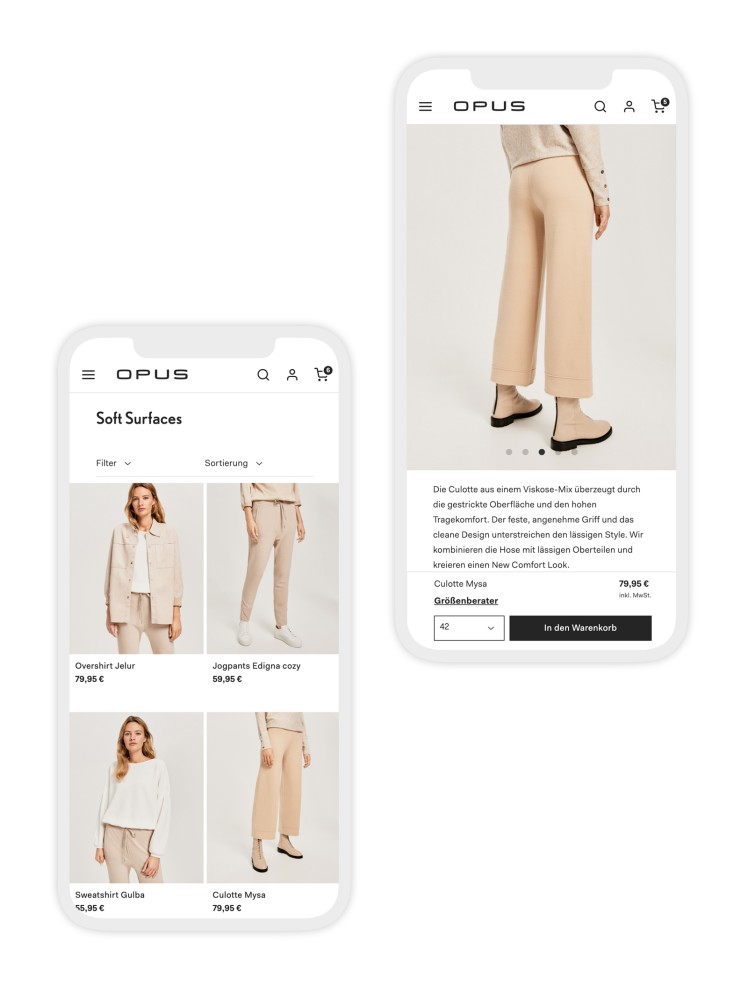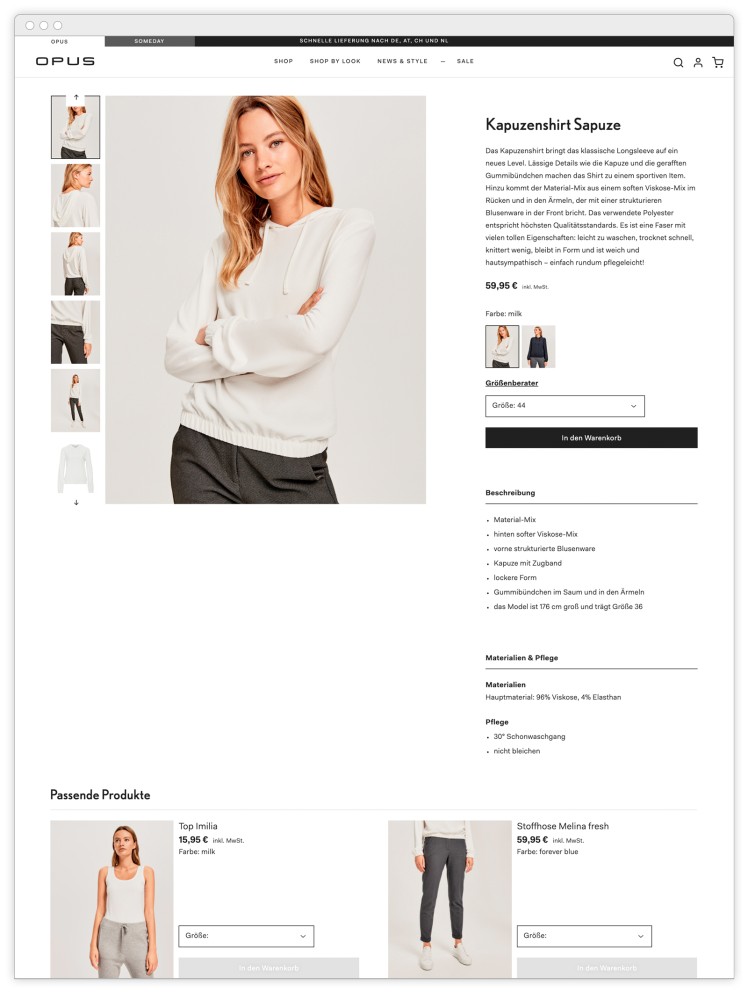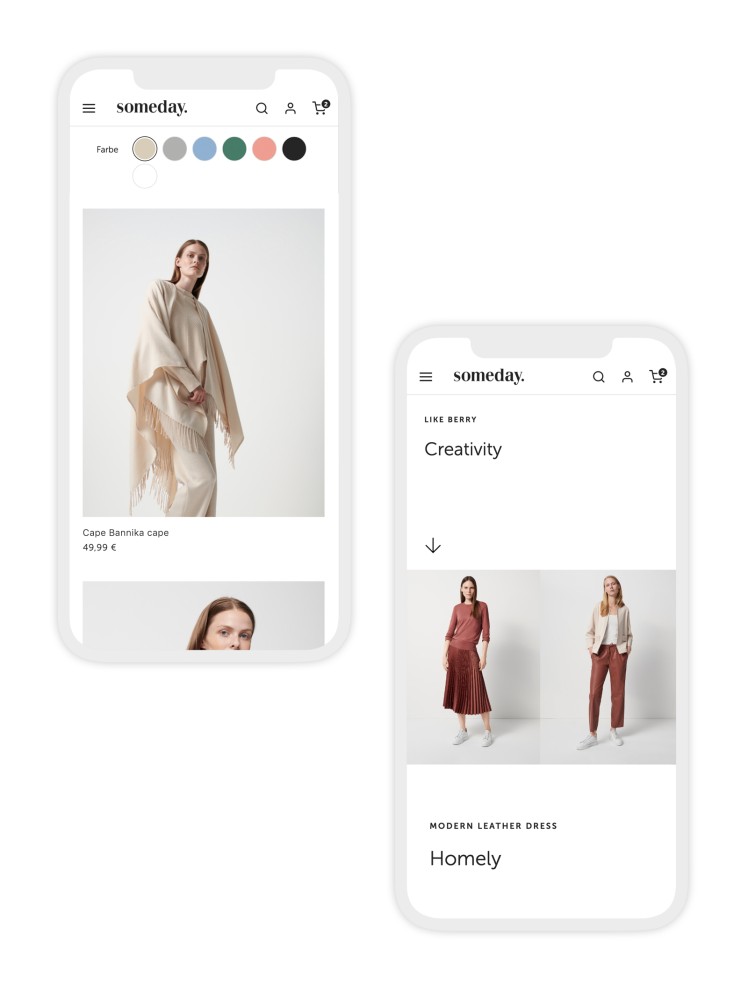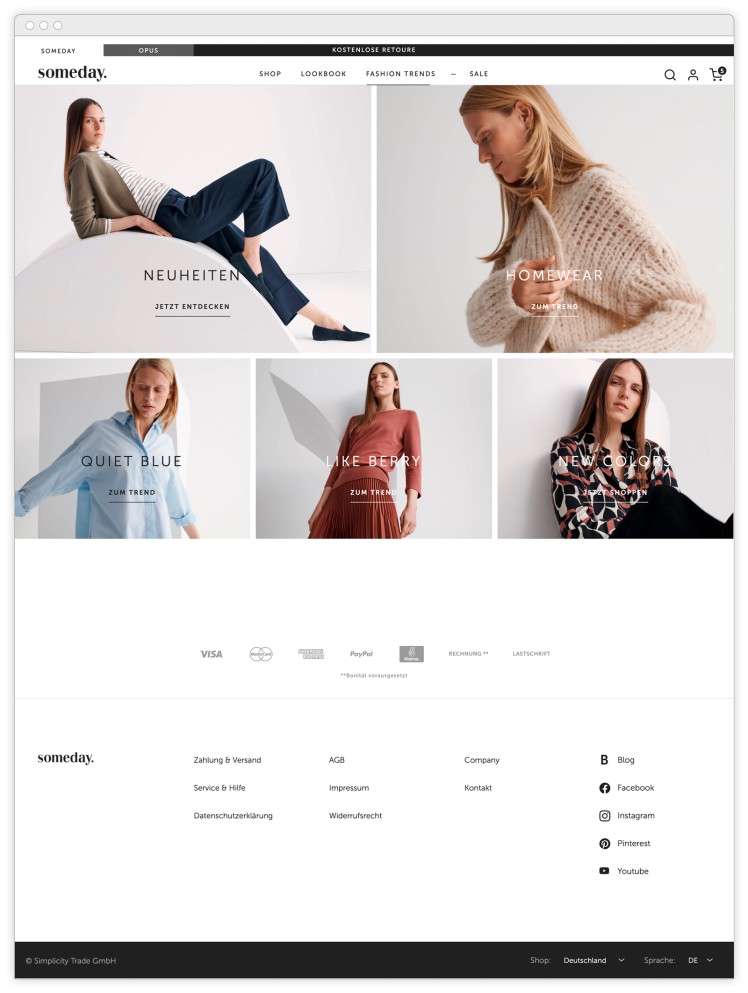Spryker Commerce OS
Momentum for Platform Business Models
April 21, 2021 / Christopher Möhle

In just a few years, Spryker's Commerce OS has become one of the go-to choices when selecting a technology stack in order to develop complex commerce platforms. Our long-term client Simplicity was no exception. Let's dive into the project to explain the role Spryker played and the reasons for it.
One of the core tasks of a tech agency is to provide useful arguments that make it easier for companies to make technological decisions. In our case, this means recommending and combining the right technologies for companies to implement platform business models.
In recent years, one of the most important building blocks for this has been Spryker Commerce OS – also in the case of our long-term client, the German fashion manufacturer Simplicity. This is not only because our teams are particularly good at and enjoy implementing Spryker, but out of full conviction for the technological approach behind it. Due to its modularity and openness, Spryker can be used to develop particularly future-proof applications in a very short time, provided that the requirements fit and the ambition level is right. We recognized its potential early on – and even put it to the test in the very first Spryker project ever.
It is not for nothing that we certify dozens of our developers for Spryker every year and have delivered twelve platforms that use it in just five years. A prime example of Spryker's benefits: Simplicity.
The two brand platforms for OPUS and someday are particularly sleek.
Simplicity: Fashion meets Tech Ownership.
The name "Simplicity" says it all for the fashion manufacturer from Oelde in North Rhine-Westphalia: straightforwardness, focus, clarity of vision. The company started over twenty years ago with a simple idea – making really good pants. This has developed into a business with double-digit sales growth per year. Today, Simplicity sells collections of its two brands OPUS and someday to more than 2,000 retail partners across Europe as well as directly to end customers.
The reason for this success lies in Simplicity's enormous expertise in the fashion industry, especially in brick-and-mortar retail, coupled with a strong technological focus. From the very beginning, the fashion manufacturer has invested in custom developed systems and implemented new technologies, such as intelligent warehouse systems or EDI connections. The company recognized early on: The better it can respond to demand in retail spaces, the more successful it is. Thus, Simplicity was one of the pioneers in the market able to proactively deliver goods to connected stores. The online store that existed until 2017 was also homegrown – a monolithic custom software that covered everything from merchandise management to sending out newsletters.
Into the unknown, but well prepared.
In 2017, it was time to take the e-commerce infrastructure to the next level by way of replatforming. For Simplicity, the goal was to sustain strong growth in its digital channels over the long term, while becoming even more agile as a manufacturer in a dynamic market. Thus began the search for the right tech stack.
Looking for a suitable commerce system begins with two lists: one contains all the desired features, the other all the things systems in the market are able to cover. If you put them on top of each other, you inevitably end up with a delta – and that's where the problems start: requirements that remain unfulfilled mean effort, either beforehand in the planning stage or afterwards, when they have to be custom developed. However, you never know in advance what you will need later: the most complex requirement of commerce is its own unpredictability. The fact that most companies today, especially like Simplicity, have highly sophisticated IT landscapes that need to work well with or be replaced by something new only makes things more complex.
At the same time, requirements are interpreted much more flexibly today than they were a few years ago. The relevance of detailed specifications is declining, while the desire for agile methodology and a scalable development process is increasing. The path to the future of commerce software therefore leads to frameworks and APIs, to the decoupling of services, to best practices and guidelines, to functions that are independent of one another and can be exchanged or switched off without affecting the rest of the system.
Modularity is the key.
This is exactly what Spryker is all about – and what we are also so passionate about. The claim of today's almost Unicorn candidate is to provide a foundation for high-performing, maintainable and well scalable commercial applications. While Spryker provides many classic commerce system features out-of-the-box, its strengths are particularly evident in agile custom development.
This is because it is ingrained in the Commerce OS's DNA that individual components are completely decoupled from one another and can even be scaled separately. This modular architecture guarantees that new developments can be quickly and robustly integrated into productive environments and their acceptance or success tested.
With Spryker, front-end and back-end are also consistently decoupled from each other – keyword: "headless commerce". Together with the API-oriented architecture, this enables Spryker developers to create completely new sales channels in a short time and to take measures for their monitoring and, if necessary, scalability without influencing other applications. This is also what makes Spryker so future-proof: after all, you have to meet customers where they are, but no one knows today whether that will still be the same place in two years.
The system of choice for replatforming.
In the Simplicity project, our core task was to place its brand stores on a new technological foundation, to relaunch them with a new look and to integrate them into the existing system landscape. However, the first step was to map the existing range of functions in the new platform. Spryker is particularly well suited for replatforming like this.
Instead of taking the risk of developing from scratch, Spryker's foundation allows you to develop and operate technical innovations in parallel to your legacy system. If it is determined that existing solutions can also be implemented well in Spryker, they can be migrated step by step. Companies are no longer confronted with the question of »either/or«, but benefit from a smooth transition.
Customers can shop seamlessly from both of Simplicity's brands using one account, made possible by single sign-on and a shared cart.
The future can come.
In under a year of development, we created a platform for Simplicity using Spryker with two stylish brand stores, each localized for four countries, that integrates smoothly into the rest of the system landscape. Features such as a cross-brand shopping cart, single sign-on between both stores and a fast checkout create an extremely convenient shopping experience for customers. Thanks to continuous optimization during operation, the platform is now particularly robust: peak load times do not cause it any problems – even with rapidly increasing order numbers, such as on Black Friday.
– Stefan Leewe, Managing Director, Simplicity
Spryker's modularity was particularly crucial for Simplicity. In addition to building the new commerce platform, interfaces to the rest of Simplicity's system landscape had to be developed to connect the platform. The biggest challenge was to ensure seamless communication between Simplicity's brand stores and all other business-critical components, whose interfaces changed continuously during the implementation period. This meant it was necessary to develop in parallel on several points in the system landscape. On the one hand, this speaks for Simplicity's level of ambition, but equally for the technological foundation of its systems.
Through the joint Spryker project, the platform approach has become increasingly central to Simplicity's business success in just a few years. »This benefits our continued development over the coming years enormously. With Turbine Kreuzberg, we were not only able to launch a new cross-brand platform, but also to keep developing it technologically – as well as ourselves as an organization,« says Stefan Leewe, CEO of Simplicity. Today, the fashion company is as focused in its tech ownership by consistently increasing its own expertise, as it is ready to continuously evolve. That alone should be reason enough to keep paying attention.
Christopher Möhle, COO
christopher.moehle@turbinekreuzberg.com
+49 175 321 0 941





